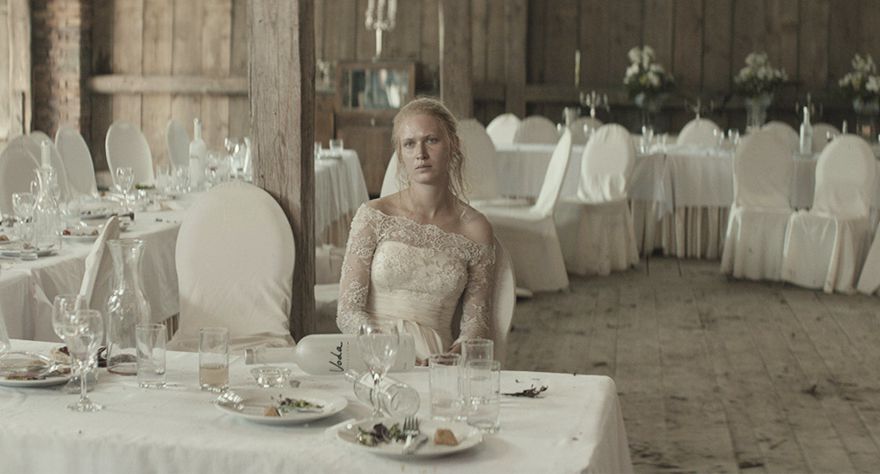
A truly unique take on the all-too-crowded possession sub-genre, but is it worth the strenuous journey?

A truly unique take on the all-too-crowded possession sub-genre, but is it worth the strenuous journey?
On paper, Marcin Wrona’s Demon should be a cliché-ridden tale of a demonic possession and the effect it has on a young couple’s relationship. After all, that’s the template for a handful of genre films that are released every single year. But Wrona’s latest is not your typical possession story—it’s something entirely different.
Piotr (Italy Tiran) arrives in a small town in rural Poland to marry his fiancé, Żaneta (Agnieszka Zulewska), on her family’s homestead. Shortly before the wedding, the groom-to-be discovers skeletal remains in the family’s backyard. Despite initially brushing off the macabre discovery, Piotr begins to suspect something sinister is afoot when he sees flashes of a dead woman lurking around the wedding. As Piotr begins acting erratically, the guests believe at first to be epileptic attacks, but then are quickly diagnosed as the acts of a man possessed by a Jewish demon known as the dybbuk. As tensions grow, the wedding party attempts to save the groom from certain death while simultaneously preventing the entire ceremony from erupting into chaos.
Despite its inherently dark and supernatural elements, make no mistake about it; Demon is not a horror movie. To be perfectly honest, it’s a stretch to even label it as a psychological thriller. It’s a movie that is almost impossible to put it into a specific box because of its seemingly endless layers. For much of the film, Demon plays out like a traditional drama and then swiftly transitions into a pseudo-comedic tale of a seemingly cursed wedding. Even the dybbuk—the film’s sole villain—isn’t imposing and has the appearance of a lovely, albeit dead, young woman. Still, there are some legitimate horror aspects throughout, including a very on-the-nose homage to The Shining. But Demon is as much in line with My Big Fat Greek Wedding as it is with Stanley Kubrick’s masterpiece.
There’s a distinct sense of humor on display, but the screenplay (which is co-written by Wrona and Pawel Maslona) doesn’t feature many setups or punch lines. Instead, the levity arrives through the guests’ confused, frustrated, and indifferent reactions to the absurdity that occurs once Piotr begins to see the dybbuk. The film’s most significant comedic relief comes in the form of a priest who desperately wants to leave the wedding, but constantly runs into roadblocks that prevent him from leaving the reception. Without a driver’s license, the priest is eventually forced to catch a ride home with an atheist doctor who has had one too many celebratory drinks. The entire sequence should feel completely out of place in a film like Demon, but it somehow manages to work.
Utilizing naturalistic performances, the acting is good across the board. As Piotr begins to crack under the pressure of the dybbuk’s presence, Tiran expresses paranoia through eerie physicality. While his reactions are chaotic and exhausting, they’re never over-the-top or silly. The real meat of the film comes from the family’s conflicting reactions to Piotr’s illness or possession, and the dramatic scenes of heated debate on the issue are finely acted and engaging.
Sadly, Demon doesn’t really go anywhere, and the end of the film leaves you asking if the destination was truly worth the strenuous journey. Given its subject matter and the atmospheric, haunting, and mildly creepy first act, it’s frustrating that there aren’t any significant scares or notable payoffs. Demon is unlikely to do for awkward Polish weddings what Jaws did for the ocean, but it’s the first truly unique take on the all-too-crowded possession sub-genre to come along in some time, and there’s something to be said for that.